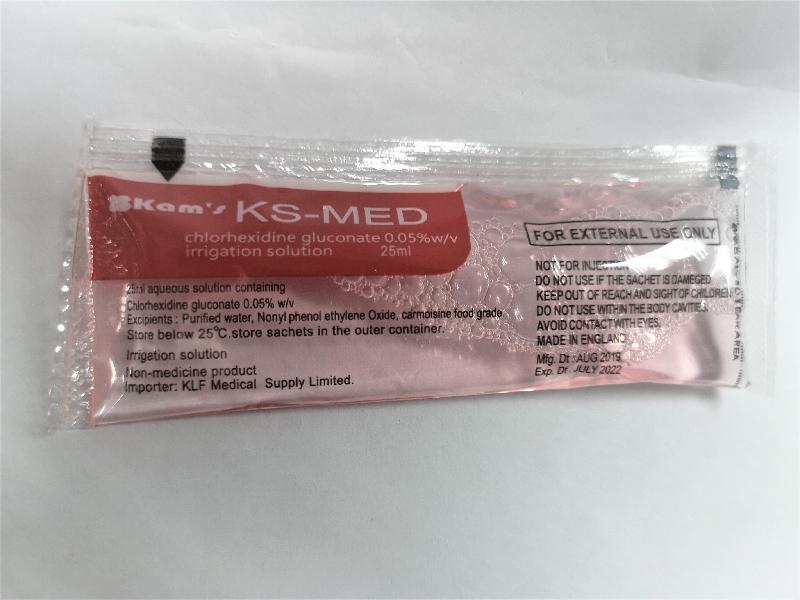Update on Burkholderia cepacia complex infection (with photo)
*************************************************************
Ongoing investigations of the Centre for Health Protection (CHP) of the DH since first notification yesterday by the Hospital Authority (HA) have identified an additional 117 and 11 renal dialysis patients who were diagnosed as having Burkholderia cepacia complex infection in the past two years by public hospitals and private hospitals respectively.
As of today, a total of 181 patients were known to be affected, comprising of 84 males and 97 females aged 24 to 100. Epidemiological investigations are ongoing.
Meanwhile, the DH received notification from the HA on an incidental finding about another prepacked aqueous chlorhexidine product named Kam's KS-MED solution which tested positive for Burkholderia cepacia complex.
Based on the HA's findings, the DH urges members of the public not to use the product, which is available for sale in shops in some hospitals, local shops and pharmacies for wound care.
The product is distributed by Kam Sing Medicine Co. (Kam Sing). The DH conducted a joint operation with Hong Kong Customs at Kam Sing in Tai Kok Tsui today during which samples of the product and related materials were collected for analytical tests. In the operation, Customs seized 495 sachets of the product bearing suspected false claim of origin with a total estimated market value of about $990. A 72-year-old male sole proprietor of the company was also arrested. Investigations by the DH and the Customs are ongoing.
Kam's KS-MED solution contains 0.05 per cent chlorhexidine gluconate and is labelled "Non-medicine product". Therefore, it should not be used for wound care or on broken skin. As a precautionary measure, Kam Sing has voluntarily recalled the product from the market and has also set up a hotline (2392 7537) to answer related enquiries during office hours.
Currently, products containing a low concentration of chlorhexidine not labelled for use on broken skin or wound care are not classified as pharmaceutical products under the Pharmacy and Poisons Ordinance (Cap 138). The DH will continue to conduct market surveillance on similar products available on the market.
"Members of the public, especially those who have a weakened immune system, such as renal patients, should pay extra attention to personal hygiene. Antiseptic products not indicated for wound care should not be used for that purpose or on broken skin. The public should also follow the instructions given by healthcare professionals on wound care and should seek medical advice if in doubt," a spokesman for the DH said.
"According to the Infection Control Guidelines on Nephrology Services in Hong Kong, sterile solution of 0.9 per cent sodium chloride or antiseptic solution (e.g. aqueous chlorhexidine 0.05 per cent) can be used for peritoneal catheter exit site cleansing," the spokesman said.
"Normal saline (solution of 0.9 per cent sodium chloride) is a commonly used cleansing fluid. As it is similar to human body fluid, it does not irritate wound tissues and causes less pain when applied. Antiseptics may irritate the wound or cause an allergic reaction. Generally, a non-infected wound could be cleansed with normal saline and antiseptics are not required, while an infected wound must be managed according to a doctor's instructions," the spokesman added.
Under the Trade Descriptions Ordinance, any person who supplies goods with a false trade description in the course of trade or business, or has in possession of any goods for sale with a false trade description, commits an offence. The maximum penalty upon conviction is a fine of $500,000 and imprisonment for five years.
For more information on wound care, please visit www.elderly.gov.hk/english/healthy_ageing/home_safety/wound_care.html.
Ends/Thursday, September 19, 2019
Issued at HKT 22:28
Issued at HKT 22:28
NNNN





